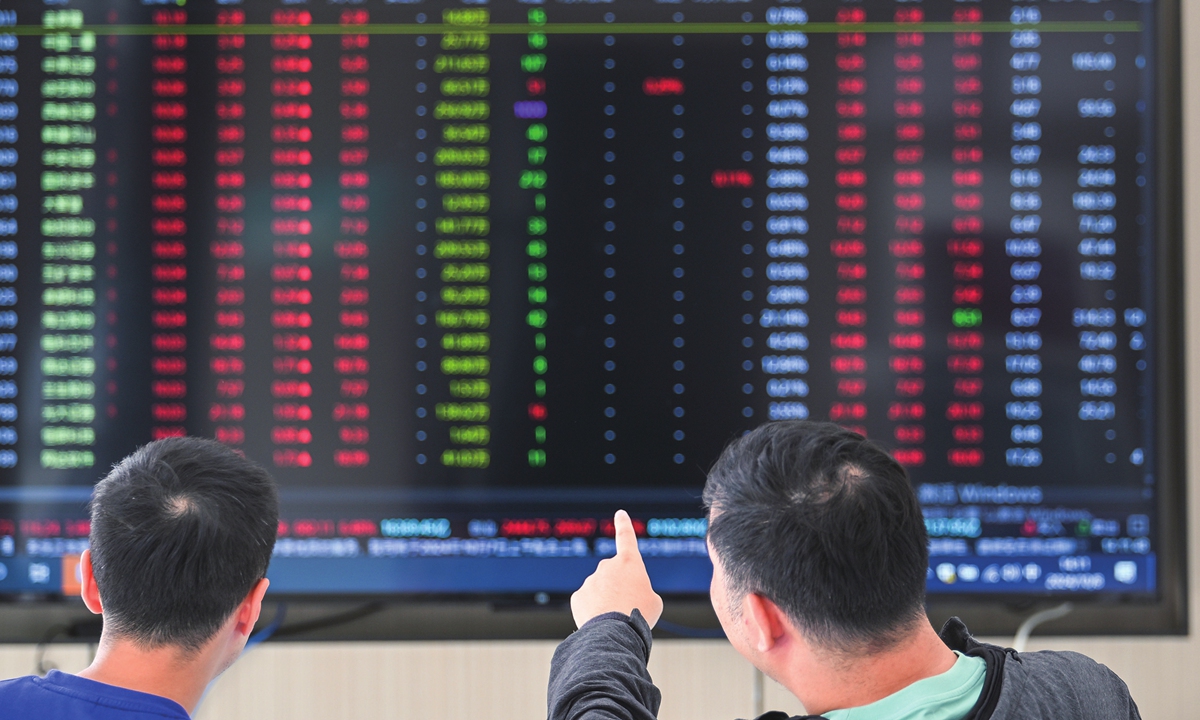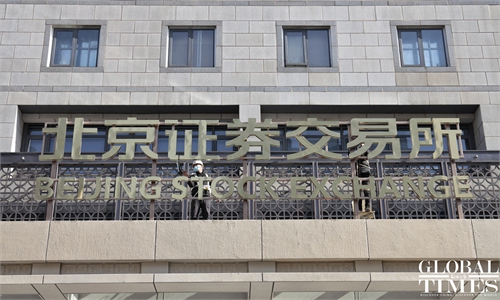China's A-share turnover tops 1tr yuan for 31st trading day
More capital inflows expected as policy measures revive investor confidence: expert

Two men view a stock market monitor in Nanjing, East China's Jiangsu Province on October 8, 2024. Photo: VCG
The combined turnover of China's Shanghai and Shenzhen stock exchanges exceeded 2 trillion yuan ($276.96 billion) on Wednesday, marking the 31st consecutive trading day that the two bourses saw total turnover exceed 1 trillion yuan, according to market data.Analysts said that the heavy turnover underscores investors' confidence in the trend of the A-share market, thanks to the joint effect of factors including a package of policy measures, incremental fund flows and improvement in China's economic fundamentals.
According to data from information provider Wind, the turnover of the Shanghai Stock Exchange reached 829.4 billion yuan on Wednesday, while that of the Shenzhen Stock Exchange hit 1.18 trillion yuan.
The Shanghai Composite Index closed up 0.51 percent at 3,439.28 points on Wednesday, and the Shenzhen Component Index grew by 0.40 percent to 11,359.29 points. The ChiNext Index, tracking China's Nasdaq-style board of growth enterprises, rose 1.11 percent to 2,417.25 points.
"Heavy turnover shows that investors are confident in the trend of the A-share market," Yang Delong, chief economist at Shenzhen-based First Seafront Fund, told the Global Times, projecting that more capital is expected to flow into the A-share market.
"Driven by targeted policies, it is just a matter of time for improvement in economic figures. As a barometer of the macroeconomy, the capital market generally signals economic changes about half a year in advance," Yang said.
Chinese authorities have stepped up macroeconomic policies since September, with the financial regulators announcing a broader-than-expected policy package that includes reducing the reserve requirement ratio. On Friday, Chinese lawmakers approved a State Council bill to raise the ceiling on local government debt by 6 trillion yuan to replace hidden debts.
According to our recent discussions with investors, market sentiment, especially that of investors in the Chinese mainland, has seen a notable improvement, and optimistic investors project the Chinese central government may roll out more support policies, Wang Zonghao, head of China equity strategy research at UBS, said in a note sent to the Global Times.
In addition, the growth momentum of Chinese companies is expected to improve during the fourth quarter due to a comparatively lower base in the same period last year, more fiscal expenditures and potential interest rate cuts by the People's Bank of China, the country's central bank, according to Wang.
Wu Qing, chairman of the China Securities Regulatory Commission (CSRC), recently convened a meeting with securities firms and asset managers in Shanghai to discuss how to boost the stable and healthy development of the capital market, according to a statement on the CSRC's website on Sunday.
Stressing that securities firms and asset managers are important agents in the capital market, Wu called for these financial institutions to increase their professional capabilities such as investment banking, investment and research so as to effectively meet the demand for investment and financing and better give play to the role of the capital market.



